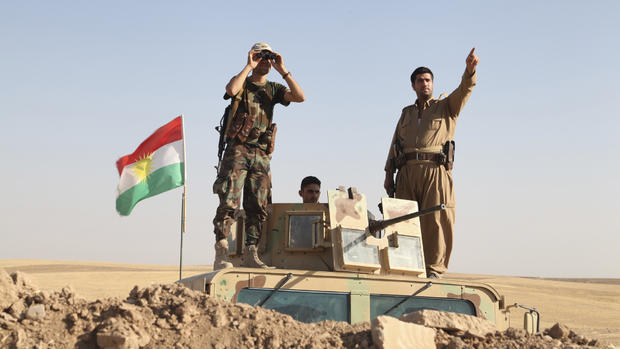Emboldened by U.S. strikes, Iraq goes on offense
BAGHDAD -- Clashes broke out Tuesday between Iraqi security forces and militants on the outskirts of Tikrit, a local official and a resident said, a day after the Iraqi and Kurdish troops backed by U.S. airstrikes dislodged the Islamic State of Syria and Iraq (ISIS) from a strategic dam in the country's north.
The United Nations refugee agency, meanwhile, said it is launching one of its largest aid pushes aimed at helping close to a half million people who have been forced to flee their homes by the violence in Iraq.
The clashes began on the southwestern outskirts of the militant-held city of Tikrit, located about 80 miles north of the capital, when a military convoy was travelling along the main highway that links Baghdad with the northern provinces, they said.
CBS News' Charlie D'Agata, standing atop the Mosul Dam on Tuesday, reported that while Kurdish "peshmerga" forces were in control of the facility, they said they were going to need continuing U.S. air power to ward off any attempts by ISIS to launch a counter-attack.
Fighting resumed in the area around the dam complex on Tuesday morning, with U.S. jets seen in the skies above, but D'Agata and his team said it did not appear to be too close to the compound.
D'Agata said there wasn't much structural damage to the dam after the fight on Monday, but there were many signs of what went on.
The dam itself was littered with spent shells, and on the road to the sprawling complex there were bombed out cars; ISIS vehicles, CBS News was told, left barely recognizable. There were whole buildings that had been demolished and craters, presumably from airstrikes.
The Iraqi military shelled militant positions inside and outside the city, they said. There were no immediate reports of casualties. Both spoke on condition of anonymity, fearing their safety.
ISIS, which has renamed itself simply the "Islamic State," has occupied Tikrit and the northern city of Mosul since early June, as well as large parts of the country's north and west. The militant onslaught has plunged Iraq into its worst crisis since the withdrawal of U.S. troops in 2011.
The group since has imposed a self-styled caliphate in territory it controls in Iraq and neighboring Syria, imposing their own harsh interpretation of Islamic law.
Sporadic clashes have been reported around Tikrit and other areas since then, but efforts by Iraqi government forces and allied Sunni tribal militiamen have failed to push out the militants. Earlier this month, the tomb of former Iraqi dictator Saddam Hussein located near Tikrit was damaged in clashes between security forces and the radical group.
On Monday, Iraqi and Kurdish forces recaptured Iraq's Mosul Dam less than two weeks after it was seized by the militants. The dam is the largest in Iraq and a vital power and water resource for the country.
The gains made by the militants brought U.S. forces back into the conflict for the first time since they withdrew in 2011. America's renewed involvement on the battle field was a reflection of the growing international concern over the Sunni extremist group. Washington began carrying out dozens of airstrikes on Aug. 8.
Hours after retaking the dam, President Barack Obama called the development a "major step forward" in the battle against the group.
Obama said a breach of the dam could have had catastrophic consequences and endangered U.S. Embassy personnel in Baghdad. He said the U.S. was urgently providing arms and assistance to Iraqi security forces as well as Kurdish fighters fighting the extremists.
"We've got a national security interest in making sure our people are protected and in making sure that a savage group that seems willing to slaughter people for no rhyme or reason other than they have not kowtowed - that a group like that is contained, because ultimately it can pose a threat to us," Obama told reporters.
Some 1.5 million people have been displaced by fighting in Iraq since the Islamic State's rapid advance began in June, and thousands more have died. The scale of the humanitarian crisis prompted the U.N. to declare its highest level of emergency last week.
On Tuesday, the U.N. refugee agency announced that it will begin a massive air, road and sea operation Wednesday, starting with a four day airlift using Boeing 747s from Aqaba in Jordan to Iraq's northern Kurdish region.
"Many are still coming to grips with the tragedy they've been through in recent weeks - fleeing homes with nothing, and many trying to cope with the loss of loved ones," Adrian Edwards, a spokesman for UNHCR, said in a statement. "Emergency support is an urgent need that we are trying to meet."
